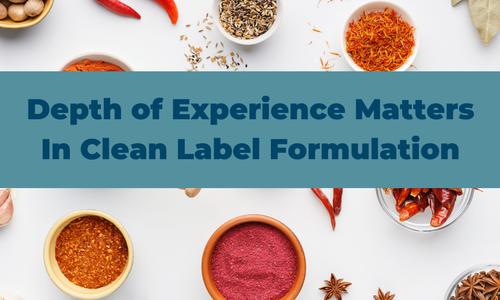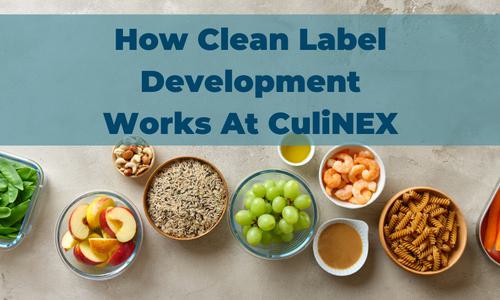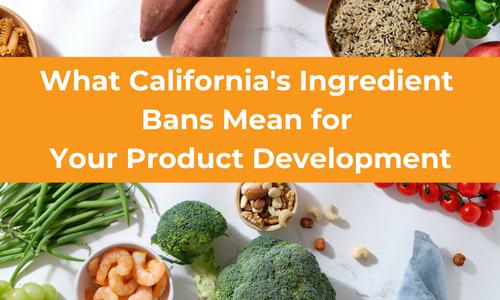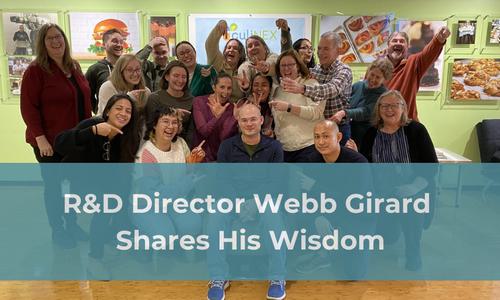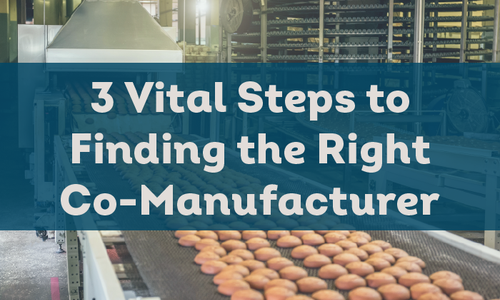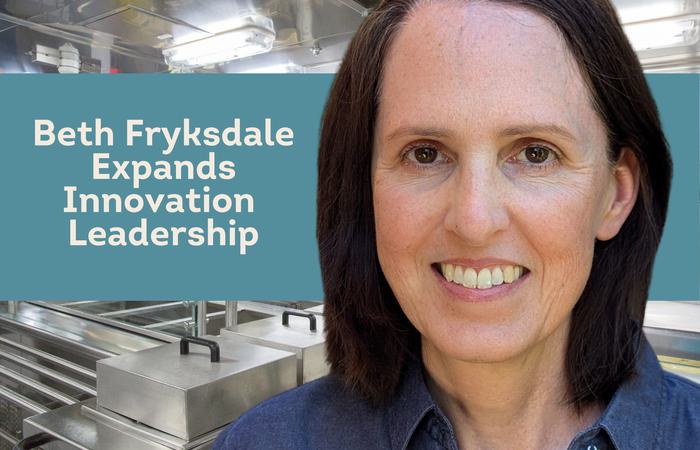
Beth Fryksdale is proud to join the CuliNEX team. Beth is a seasoned food scientist and product development expert with deep expertise in food safety, proteins, plant-based foods, Clean Label, and product strategy for both foodservice and CPG retail products.
“I have always been, since I was a little kid, super excited about food manufacturing plants,” said the newest teammate at CuliNEX, Beth Fryksdale. Perhaps this fascination came from the movie Willy Wonka and the Chocolate Factory or maybe it grew out of her love of delicious food. Beth’s childhood passion sparked a successful career.
First, Beth aspired to be a food inspector. “I was also very interested in food safety,” said Beth. “We used to go to this all-you-can-eat buffet, and they had a little sign in the window stating, ‘This facility passes the county inspection.’ I would practice with my mom, when she was at home, cooking in our kitchen saying things like, ‘Mom, be sure to wash your hands between the chicken and the carrot.”
Solid Food Science Education
As a child and teen, it did not occur to Beth that she might study culinary science in college. Then one day, while paging through a college course catalog, she found her ideal career. “I was literally reading through the list of majors in alphabetical order,” she said. “All the obvious majors seemed uninteresting. I got to the letter F, and it said ‘Food Science.’ I read the tiny little description and instantly I knew that that's what I needed to major in. I didn’t look at any other letters of the alphabet.”!
Beth applied to a range of schools that offered food science degrees and matriculated at Cal Poly in San Luis Obispo, California. “I was 1,000% focused on Food Science,” she said. She quickly became a straight-A student and stayed on to get a master's degree in Dairy Science as well.
From Food Tech to Bio Tech
Coming out of school, Beth was committed to living in the Bay Area. In that high-tech region, she could not find an interesting food science job. “Someone suggested that I might consider biotechnology, which is a related field that needed my skill sets,” she said. Beth intended to work in biotech for six months or so but ended up staying there for 12 years. “It wasn't food product development, which was the original dream, but it was a closely related field, and a really cool company.”
That biotech company had a congenial atmosphere and was frequently on “Best Places to Work in America” lists. Her job allowed her to travel globally. “I learned how to become a really good scientist at that company, because there was a lot of good mentoring. They had a very high bar for the quality of their work. “
That company endured a series of mergers and acquisitions. Over time it became larger and more bureaucratic. “So, I decided to try the opposite,” said Beth. The opposite looked to Beth like a startup. She also decided to return to her first love: food science.
An “Impossibly” Great Experience in Food Innovation
At that time, Impossible Foods was just getting off the ground. They were hiring an initial technical team tasked with the challenge of figuring out how to make new plant-based protein products. That sounded ideal: demanding, innovative, and all about breaking new ground in the science of food.
“The early days were ridiculous. I did not have a desk: I had a beanbag chair,” she said. When Beth walked into the reception area for her interview, she didn’t see any people—just a collection of bicycles. It turned out the organization was too small to hire a receptionist. And they decided their front room would be a cool place to park the bikes they used to commute to work.
Beth recalls another anecdote that happened shortly after she joined the company. “Here we are making plant-based hamburgers, which admittedly need to be cooked. But we hadn't sorted out the permitting with our landlord yet, and we were told we were not allowed to cook inside the building. We were like, ‘Okay, that's fine, but the contract doesn't say anything about the parking lot.” So, the team moved the lab out to the parking lot. “We cooked our burgers on carts,” she said. “Since we were cooking in the parking lot, my manager brought a blanket to work and soaked it in water,” she said. “He would stand nearby, in charge of the blanket, in case anything caught on fire. The plan was, he’d throw this wet blanket over top of my head, and that was our fire suppression system.” Fortunately, the parking-lot lab only lasted a few months before they returned to the building with valid permits.
While the job had some funny events in the early days, Beth took the role seriously and grew with the company, ultimately serving as their VP of Quality and Product Development. Beth gained experience in scale-up, co-manufacturing, and leading complex technical projects for new products and new manufacturing lines. Beth ultimately led a team of 37 scientists and engineers, managed a $4M budget, and marked big accomplishments such as launching 65 products within one calendar year.
Startups and Self-reflection
After Impossible, Beth had a short stint with a plant-based cheese startup. That led to a more reflective period in her life. “I spent a lot of time journaling and thinking through what things are important to me,” she said. Her reevaluation led her to move to a consulting role. This way, she could bring all her experience to bear on an array of projects
Consulting allows Beth to help many companies at the same time and ultimately add more value to the world. She helps small and early-stage food companies grow and successfully launch their first products. She also helps larger companies understand cutting edge food technology and keep their teams nimble by borrowing some practices from startups.
New challenges at CuliNEX
Now, at CuliNEX, Beth’s looking forward to her role as Product Development Manager, Food Scientist. She plans to share her culinary, scientific, and management skills with the team in the Seattle area and clients from around the world.
In addition to the technical work, Beth’s role also includes supporting the technical team as a people leader and manager. “I'm excited to work on some food science challenges, and some team growth and development, which I expect to be very satisfying.”
The CuliNEX Advantage
Beth’s first days at CuliNEX are in some ways the opposite of her first days at Impossible. Instead of the tumult of a startup, Beth has found CuliNEX to be a well-established, smooth-running organization. “CuliNEX is very tight in terms of process. We get a client, we have this meeting, we fill out this form, we put it in the spreadsheet. We track every dollar. We track every minute,” said Beth. “It is quite an amazing infrastructure. Process doesn’t get in the way of creativity or teamwork, and that’s a recipe for success.”
And unlike the company that used a reception area for bikes and cooked in the parking lot, the facility at CuliNEX is modern, spacious, and well-equipped. “At CuliNEX, we have awesome equipment and tons of space to spread out,” she said. The CuliNEX building used to be a culinary school, so the kitchen is built to be large enough to hold 30 chefs. “Any lab I've ever worked in before, you're cramped in a tiny little corner, and you're kind of fighting with your lab mate over counter space,” said Beth. “I'm surprised that the space at CuliNEX is as big as it is, and that is pretty cool.”

